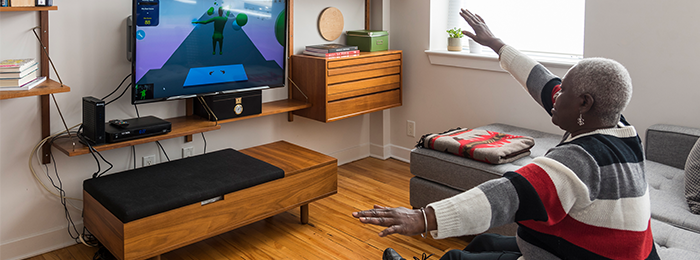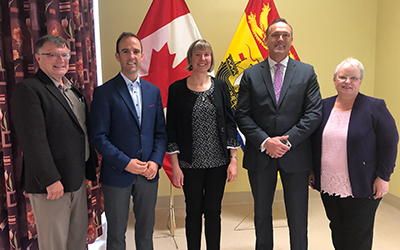
Virtual and remote rehabilitation keeps care on track
Meeting the needs of our patients means providing best-evidence practices every step of the way. Bruyère is the region’s largest single-site academic provider of inpatient and outpatient rehabilitation, and our research and innovation in this area is strong. Over the last few years, we have looked at the feasibility and impact of virtual rehabilitation and tele-rehabilitation, which has significantly contributed to Bruyère’s ability to quickly pivot to virtual and remote program delivery.
Physiotherapist and researcher, Jennifer O’Neil, alongside clinical investigator Dr. Shawn Marshall, supports Bruyère’s goals of improving accessibility of rehabilitative care for patients, both as inpatients and outpatients. Her work, funded by CABHI and CIMHVR-True Patriot Love, which has examined the use of remote supervision of exercise programs for individuals in rural communities, moves Bruyère forward in our ability to offer home-based rehabilitation and extend our reach to vulnerable populations.
 The care we continuously advance through research, innovation, and implementation of best-practice at Bruyère happens onsite every day. With the spread of COVID-19, we have been well positioned to pivot this work to support our outpatient populations, using our knowledge of virtual and remote rehabilitation programs. Our research geared toward understanding the feasibility and success of using remotely supervised programs to improve health, mobility, and physical activity in aging adults has quickly transitioned to innovative virtual care practices during the pandemic.
The care we continuously advance through research, innovation, and implementation of best-practice at Bruyère happens onsite every day. With the spread of COVID-19, we have been well positioned to pivot this work to support our outpatient populations, using our knowledge of virtual and remote rehabilitation programs. Our research geared toward understanding the feasibility and success of using remotely supervised programs to improve health, mobility, and physical activity in aging adults has quickly transitioned to innovative virtual care practices during the pandemic.
Lisa Sheehy, physiotherapist, PhD, and investigator and Dr. Hillel Finestone, physician and investigator at Bruyère have also continued the pursuit of virtual reality experiences in both inpatient and outpatient rehabilitation. As the co-lead to the Healthy Seniors Pilot Project, a $75-million three year initiative launched in New Brunswick during the summer of 2019, Sheehy has been working on the evaluation of non-immersive virtual reality exercises to seniors’ rehabilitation programs, both in home settings and in long-term care facilities.
Her work has been instrumental in adapting to rehabilitation needs during the pandemic. Quick to identify the challenges the virus created in care delivery, Sheehy delved into how rehabilitation programs would need to adapt for patients who had become ill. On top of leveraging her previous work in virtual rehabilitation tools and programs, within a few months of the outbreak she published work on the considerations for post-acute rehabilitation of COVID-19 survivors, outlining key recommendations in the future of design for rehabilitation units and considerations with respect to recovery of the respiratory system in conjunction with mobility and function.
We continue to transfer research and innovation into care, as we help patients transfer from hospital to home. The implications of COVID-19 on delivering care have been numerous. Bruyère’s long-standing dedication to care and research and innovation in rehabilitation has given us an advantage in adapting to our patients’ needs; keeping them healthy and engaged in their recovery with us, either in our spaces or theirs.